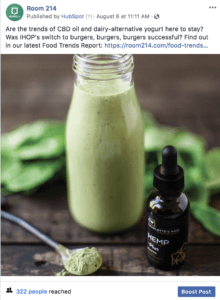Should I Boost My Facebook Posts?
Our organic engagement rates are plummeting on Facebook, should we boost our posts?
In the age of dwindling organic engagement for business pages on Facebook, we hear this question frequently and think it’s important to approach with a critical eye.
Let’s start by walking through exactly what happens when you decide to boost a post.

Facebook often prompts you to Boost your post with a convenient notification letting you know your “post is performing better than 90% of other posts on your Page. Boost it to get more great results.” If you haven’t received a notification, you’ll also find the “Boost Post” button conveniently located under each of your posts.
Once you hit it, you're asked to make adjustments to three fields: select an audience, set a budget, and enter your campaign duration.
Once completed, Facebook automatically creates a new ad in your ads manager account with an objective of “Page Post Engagement”, defaults it to desktop and mobile news feed placements, and your ad runs for your selected duration.
But, it’s so easy, how could that be a bad thing?
They’ve made it so easy, in fact, that we find many companies are overusing the function, sometimes relying on it exclusively.
Facebook has made it extremely easy for you to spend your money without any significant thought or strategy behind it. Plus, the instant gratification of likes, comments, and shares can make boosting tempting.
Before you hit that alluring blue button, here are the downsides you should consider:
- Lack of control: The problem with promoting a post through the boost function instead of using ads manager lies in the lack of control. You have little to no input on the ad objective, targeting options, and placements
- Lack of clear data: You can't isolate paid vs. organic performance (i.e. with Google Analytics tags) if you boost
- Not reaching potential new customers: When you boost, your reach is limited to your own fans and potentially friends of your fans, people who are likely already customers, or not interested in your content, so you wouldn't be reaching any potential new customers
With all of this in mind, let’s revisit your brand’s recently boosted post. What is its purpose? Who is it intended for? Does it contain a link? If it does, you are now paying per engagement and not per click and you could be spending money on an action that isn’t helping you achieve your goals. See the problem?
Are there ANY times where I would want to boost a post?
If the goal of your post aligns with the default settings of Boost Post, then yes. Ask yourself if it makes sense strategically to run an engagement ad, with desktop and newsfeed placements, to a broad audience that has expressed interest in your brand.
For example, if the goal of your post is to inform as many of your existing fans about a particular social contest, and the message is generalized enough to make specific targeting unnecessary, then boosting a post might be smart. The benefit of boosting in this instance is that a boosted post does not carry the label “sponsored”, and encouraging contest entries may be easier.
Still having an existential crisis trying to answer the question "to boost or not to boost"? We're here to help you and your brand on any unique scenario that arises. Just contact us.
Related Articles
The Great Facebook Engagement Drop of 2018